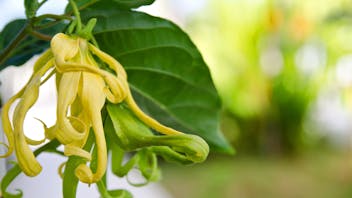Product Overview
Amyris essential oil has a very tenacious, complex, soft woody, oily-sweet balsamic aroma with a light pepper/ginger-like high note that fades to a light vanilla-like sweetness in the drydown. It is valued as a well-known fixative, especially in soaps,[1] and finds extensive application as a mild blender in numerous types of perfumes.[2]
The Amyris tree is a member of the citrus (Rutaceae) family but bears no fruit. However, it is of great value to locals who use it for firewood and, since the hard-grained, dense wood is heavy with aromatic resins, branches serve as excellent, bright-burning torches. The sedate density and resin-rich nature of Amyris tend to bring an ambiance of sweet balsamic calm to those who envelop themselves with this oil.
Amyris is distilled from a small bushy tropical evergreen tree, Amyris balsamifera, indigenous to Haiti that also grows wild in the Bahoruco Forest of the Dominican Republic. It is in this forest where the environmentally friendly task widely known as ‘cleaning the forest floor’ of only dead, dry wood for distillation helps to prevent fires and gives young, green saplings a better chance to thrive. With the current rate of dead wood collection being monitored by the Dominican Ministry of the Environment, our supplier – distilling on-site for over 40 years – has been an exemplary steward of the Amyris forests, ensuring their sustainability for future generations. Unfortunately, Amyris as contraband – often clear-cut, living wood – is routinely smuggled over the border from Haiti for the production of charcoal, leading to an environmental hot spot that, if unchecked, could very likely become irreversible.[3]
Although often referred to as West Indian Sandalwood, due to its similar aroma, Amyris is not related botanically[4] and therefore is not a substitute for Sandalwood in aromatherapy[5], nor does it provide the same depth and character scent-wise as true Sandalwood. Because Amyris essential oil offers a sweet-woody, balsamic aroma, it is a practical, less expensive alternative to Sandalwood essential oil, and provides good fixative value; it can also be mixed 1:1 with Sandalwood as a cost-effective measure.
1 Lawless, Julia. The Encyclopedia of Essential Oils, 2013, p. 36.
2 Arctander, Steffen. Perfume and Flavor Materials of Natural Origin, 1960, p. 61.
3 Industry communication.
4 Lawless, Julia. The Encyclopedia of Essential Oils, 2013, p. 36.
5 Rhind, Jennifer Peace. Essential Oils – A Handbook for Aromatherapy Practice, 2012, p. 219.



